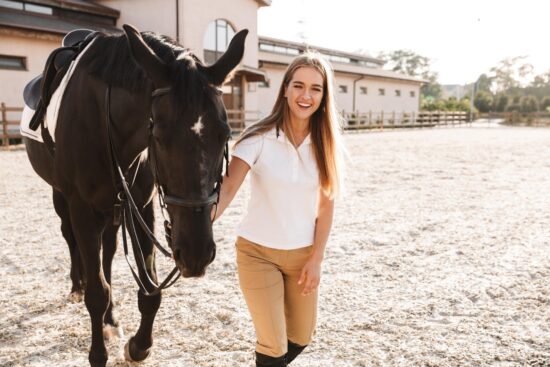Equestrian wellness is a multifaceted concept that underscores the importance of physical, mental, and emotional health for both riders and horses. Achieving peak condition requires a delicate balance of proper training, nutrition, rest, and care, ensuring that both horse and rider can perform at their best. Freddie Vasquez Jr, a respected name in the equestrian world, exemplifies the importance of a holistic approach to equestrian wellness by demonstrating how the synergy between horse and rider is crucial to success.
Understanding the Partnership
The relationship between rider and horse is at the core of equestrian wellness. Both partners must trust and understand each other to work as a cohesive team. Riders must be attuned to their horse’s needs, moods, and signals, while horses rely on their riders for guidance, confidence, and care. This partnership requires mutual respect and a commitment to maintaining peak physical and mental condition.
A rider’s wellness directly impacts the horse’s well-being. Riders who are physically fit, mentally focused, and emotionally balanced can better communicate with their horses, creating a harmonious connection. Conversely, horses that are healthy, well-trained, and properly cared for are more likely to perform at their best and build a trusting bond with their riders. The balance between the two is an ongoing effort that requires dedication, knowledge, and expertise.
Physical Wellness for Horses
Maintaining a horse’s physical health begins with proper nutrition. Horses require a carefully balanced diet that provides the right mix of energy, protein, vitamins, and minerals. The type of feed and the frequency of meals should align with the horse’s workload, age, and individual needs. Water is equally essential, as dehydration can quickly lead to serious health issues.
Regular exercise is another cornerstone of a horse’s physical wellness. A structured training program helps build strength, endurance, and flexibility while preventing injuries. Warm-ups and cool-downs are critical to any exercise routine, allowing muscles to prepare for activity and recover afterward. Consistency in training helps keep horses fit and reduces the risk of strain or overwork.
Preventative care is also vital. Routine veterinary check-ups, dental care, and hoof maintenance are essential for catching potential health issues early and ensuring the horse remains in peak condition. Additionally, providing a clean and comfortable living environment with adequate space for movement and rest contributes to a horse’s overall well-being.
Mental and Emotional Health for Horses
While physical health is critical, the mental and emotional wellness of a horse should not be overlooked. Horses are sensitive animals that thrive in environments where they feel secure and understood. Stressful situations, inconsistent handling, or lack of stimulation can negatively impact a horse’s behavior and performance.
Training methods that emphasize patience, consistency, and positive reinforcement help foster a horse’s confidence and willingness to learn. Allowing horses to experience varied activities and environments can keep them mentally engaged and reduce boredom. Horses that are mentally stimulated are generally happier, more cooperative, and better equipped to handle the challenges of training and competition.
A horse’s emotional state is closely tied to its living conditions. Providing companionship, whether from other horses or human handlers, can reduce feelings of isolation and stress. Establishing routines and maintaining a calm, supportive atmosphere also helps horses feel secure and relaxed.
Wellness for Riders
Equestrian wellness extends to riders, who must maintain their own health to effectively care for and guide their horses. Physical fitness is essential, as riders use their entire body to communicate with and control their horses. Core strength, balance, and flexibility are particularly important for maintaining proper posture and control in the saddle.
Mental focus and emotional resilience are equally critical for riders. The ability to remain calm under pressure and make quick, thoughtful decisions is invaluable, particularly during high-stakes competitions. Riders should also prioritize stress management and mental health, as these factors directly influence their ability to connect with and support their horses.
Proper nutrition and hydration are as important for riders as they are for horses. A balanced diet provides the energy needed for training and competition, while staying hydrated helps prevent fatigue and improve focus. Riders should also ensure they get adequate rest and recovery time to maintain their overall wellness.
Building a Culture of Wellness
Equestrian wellness is not a one-time effort but an ongoing commitment to prioritizing the health and well-being of both horse and rider. Building a culture of wellness involves creating routines and practices that support the physical, mental, and emotional needs of both partners. This includes regular check-ins with veterinarians and trainers, continuous learning and improvement, and a willingness to adapt based on feedback and results.
Incorporating mindfulness into equestrian routines can enhance the bond between horse and rider. Practices such as deep breathing, visualization, and focusing on the present moment can help riders remain calm and centered, which in turn creates a more positive experience for their horses. A mindful approach fosters trust and reduces anxiety for both horse and rider.
The Long-Term Benefits of Equestrian Wellness
Maintaining peak condition for both horse and rider is not just about achieving immediate success; it’s about building a sustainable partnership that can thrive over time. Prioritizing wellness reduces the risk of injuries, enhances performance, and strengthens the bond between horse and rider. For riders, it also brings a deeper sense of fulfillment and connection to the sport, while for horses, it ensures a longer, healthier, and more enjoyable life.
Ultimately, equestrian wellness is about recognizing the unique needs of both partners and committing to practices that enhance their overall quality of life. By approaching equestrianism with a focus on wellness, riders can unlock the full potential of their partnership with their horses, creating a legacy of harmony, health, and success.
